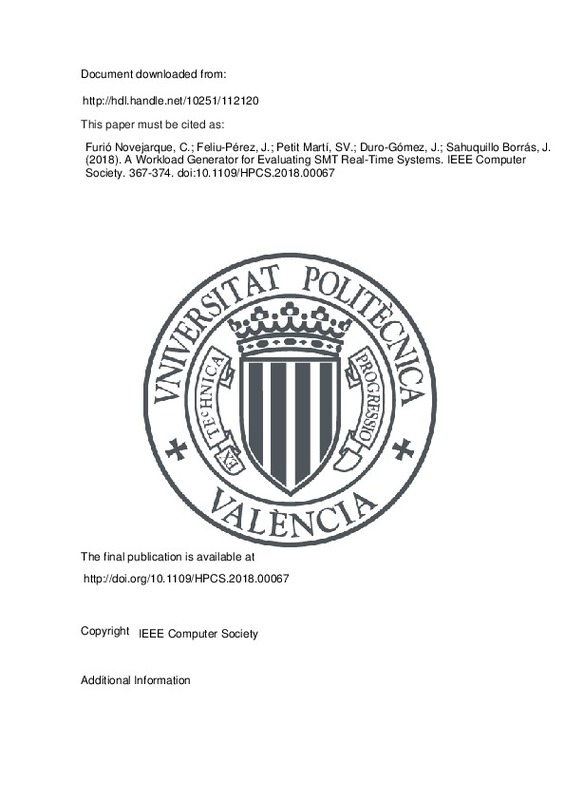JavaScript is disabled for your browser. Some features of this site may not work without it.
Buscar en RiuNet
Listar
Mi cuenta
Estadísticas
Ayuda RiuNet
Admin. UPV
A Workload Generator for Evaluating SMT Real-Time Systems
Mostrar el registro sencillo del ítem
Ficheros en el ítem
| dc.contributor.author | Furió Novejarque, Clara
|
es_ES |
| dc.contributor.author | Feliu-Pérez, Josué
|
es_ES |
| dc.contributor.author | Petit Martí, Salvador Vicente
|
es_ES |
| dc.contributor.author | Duro-Gómez, José
|
es_ES |
| dc.contributor.author | Sahuquillo Borrás, Julio
|
es_ES |
| dc.date.accessioned | 2018-11-08T12:01:33Z | |
| dc.date.available | 2018-11-08T12:01:33Z | |
| dc.date.issued | 2018-07-16 | es_ES |
| dc.identifier.isbn | 978-1-5386-7877-0 | es_ES |
| dc.identifier.uri | http://hdl.handle.net/10251/112120 | |
| dc.description.abstract | [EN] Real-time tasks have experience a significant complexity increase in the last years. We can find examples of real-time tasks in nowadays systems that control self-driving cars or multimedia systems, among others. To cope with the high performance requirements of such systems, real-time systems are moving from simple in-order processor to complex out-of-order multicore processors. Furthermore, we expect real-time systems to use simultaneous multithreading (SMT) processors in a near future since these architectures address two key design concerns of embedded systems, that is, they provide higher performance and power efficiency than single-threaded multicores. The main drawback that multicores and SMT architectures present from a real-time perspective is that they implement shared resources. Single-threaded multicores usually share the main memory and the LLC, and SMT processor share additionally most of the microarchitectural core resources. Processes running concurrently can interfere in the shared resources, which increases the performance variability and predictability of these systems. We expect an increasing effort in the next years to mitigate these drawbacks and implement real-time systems with multicore SMT processors. Workload generation is a tedious and time-consuming task in the real-time research field because the workloads dispose of many parameters that should be correctly adjusted to provide flexible and representative workloads. Typically used workload generators, however, fail when designing workloads for theses architectures because they are not aware of the architectural characteristics of SMT systems. In this paper we present the task class-based (TCB) workload generator aimed at providing workloads to evaluate real-time systems with SMT multicore processors in an ease and automatized way. | es_ES |
| dc.format.extent | 8 | |
| dc.language | Inglés | |
| dc.publisher | IEEE Computer Society | es_ES |
| dc.relation.ispartof | 2018 International Conference on High Performance Computing & Simulation (HPCS) | |
| dc.rights | Reserva de todos los derechos | |
| dc.subject | Real-time systems | es_ES |
| dc.subject | Simultaneous multithreading (SMT) | es_ES |
| dc.subject | Workload generator | es_ES |
| dc.title | A Workload Generator for Evaluating SMT Real-Time Systems | es_ES |
| dc.type | Comunicación en congreso | es_ES |
| dc.identifier.doi | 10.1109/HPCS.2018.00067 | es_ES |
| dc.rights.accessRights | Abierto | es_ES |
| dc.contributor.affiliation | Universitat Politècnica de València. Departamento de Informática de Sistemas y Computadores - Departament d'Informàtica de Sistemes i Computadors | es_ES |
| dc.description.bibliographicCitation | Furió Novejarque, C.; Feliu-Pérez, J.; Petit Martí, SV.; Duro-Gómez, J.; Sahuquillo Borrás, J. (2018). A Workload Generator for Evaluating SMT Real-Time Systems. IEEE Computer Society. 367-374. doi:10.1109/HPCS.2018.00067 | es_ES |
| dc.description.accrualMethod | S | es_ES |
| dc.relation.conferencename | International Conference on High Performance Computing & Simulation (HPCS) | es_ES |
| dc.relation.conferencedate | July 16-20, 2018 | |
| dc.relation.conferenceplace | Orléans, France | es_ES |
| dc.relation.publisherversion | http://doi.org/10.1109/HPCS.2018.00067 | |
| dc.description.upvformatpinicio | 367 | es_ES |
| dc.description.upvformatpfin | 374 | es_ES |
| dc.type.version | info:eu-repo/semantics/publishedVersion | es_ES |
| dc.relation.pasarela | S\366791 | es_ES |







![[Cerrado]](/themes/UPV/images/candado.png)

